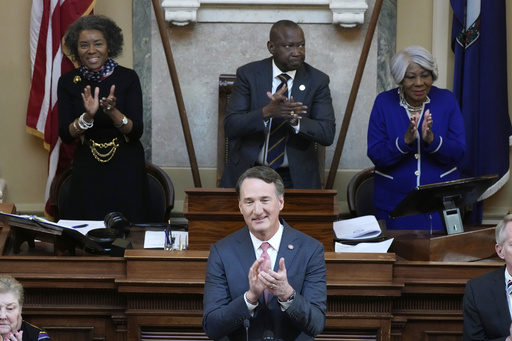
RICHMOND, Va. – On Thursday, Virginia’s Democratic-majority Senate and House of Delegates engaged in discussions about tax relief and enhancing economic stability before approving separate proposals aimed at modifying the two-year state budget. These modifications will pave the way for discussions among lawmakers regarding a comprehensive spending plan intended for Republican Governor Glenn Youngkin’s approval.
Both legislative bodies agreed on amendments that would adjust the final year of the 2024-2026 budget, thereby altering the original revisions put forward by Youngkin. Their proposals included offering a rebate of $200 for individual income tax filers and $400 for those filing jointly by October. In addition, they suggested making the refundable earned income tax credit equivalent to 20% of the federal credit. Both the House and Senate also aimed to extend and increase standard deductions for the following two years.
The amendments proposed by the lawmakers sought to revise Youngkin’s plan regarding vehicle tax relief, which intended to provide a permanent, refundable income tax credit of up to $150 for individuals earning less than $50,000 a year and up to $300 for joint filers making less than $100,000 annually. Furthermore, Democrats rejected Youngkin’s proposal to reduce the tax on tips, contending that their rebates would offer immediate financial relief to all Virginians, independent of their income levels or job types. In response, Republican Delegate Eric Zehr criticized the changes for allegedly redistributing funds away from lower- and middle-income workers, favoring the affluent instead.
Following Zehr’s comments, Democratic Delegate David Bulova expressed his acknowledgment of the challenges faced by workers in jobs that depend on tips. He emphasized that many essential workers, such as those in public service roles and fast-food positions, do not receive tips and would benefit from the proposed rebates.
The two chambers will now consider the plans proposed by one another and vote to reject them, sending the bills to a conference committee. This small group of lawmakers will convene privately to negotiate and create a compromise plan, which will then be sent to the governor for examination.
Apart from tax relief measures, several other significant points emerged during the discussions regarding the budget:
In terms of education, legislators in both chambers are determined to eliminate Governor Youngkin’s suggested $50 million amendment aimed at funding private education vouchers, which he referred to as opportunity scholarships. Last year, Youngkin’s administration also intended to introduce a new accountability framework for evaluating the effectiveness of schools statewide, but recent amendments to the Senate’s budget would postpone this initiative.
Additionally, both the House and Senate proposed a one-time bonus of $1,000 for teachers and educational support staff. After much deliberation, they allocated $223 million to lift a more-than-15-year-old cap on funding for school support positions.
As for Medicaid and federal funding, despite various amendments discussed by the lawmakers, neither chamber’s budget addressed the implications of potential changes to the federal match rate for Medicaid. Virginia is among nine states with a trigger law that would promptly conclude its Medicaid expansions if federal funding were to decline.
This follows shortly after the White House halted federal grants and loans, including Medicaid, creating a wave of uncertainty, which was then briefly suspended by a federal judge’s ruling before finally being rescinded.
On the topic of “skill games,” the recent budgets from the House and Senate reveal more consistency compared to previous years. However, the Senate passed an amendment this week that would implement taxation and regulation of “skill games,” which are gambling machines similar to slot machines that have become common in establishments like truck stops and convenience stores across the state prior to a ban. In contrast, the House chose to omit these potentially addictive games from its spending plan after Youngkin vetoed related legislation in the spring, although they did propose creating a Virginia Gaming Commission to regulate all types of gaming within the state, which includes casinos, sports betting, and the Lottery.

